“to explore the limits and modalities of this sensory apparatus”- An interview with Jessica Ekomane
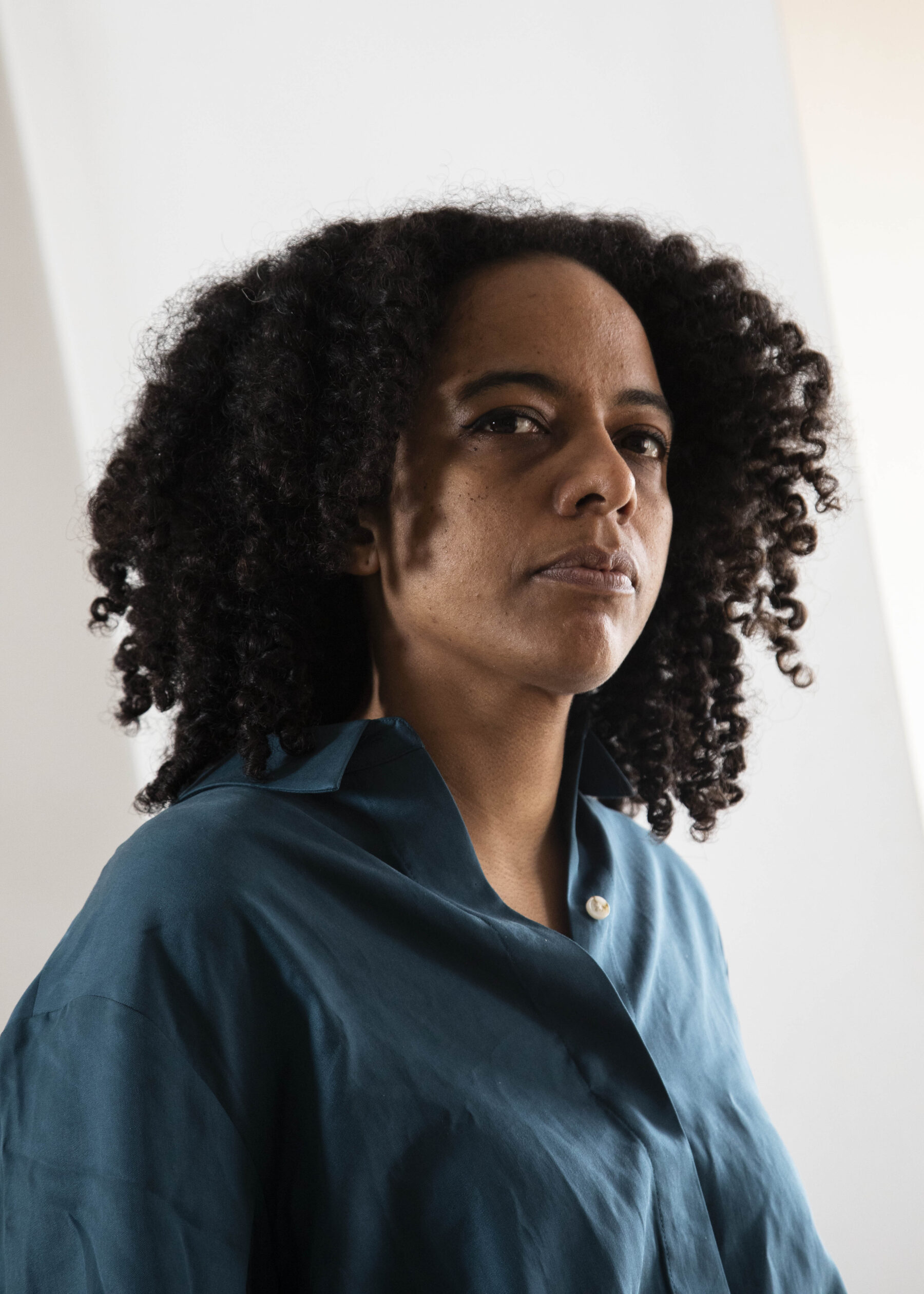
A lot of your works use rhythms/loops to tempt the listener into predicting the future. You then very skillfully phase these sequences to upset these predictions. A deep understanding of time perception seems to be the key for this practice. Can you talk a bit about your relationship with time/philosophy and how it translates into your work?
I don’t necessarily have one specific reference for time/philosophy. I’m quite interested in physics for instance, especially quantum physics. Without having any expertise in the topic, I’m regularly fascinated and inspired by how our sensory processing of time and space within our daily life differs so greatly from current scientific understanding of their behaviour. That perspective makes it interesting for me to explore the limits and modalities of this sensory apparatus, in order to understand if and how it is possible to experience alternate ways of interacting with 4 and more dimensions. With “Multivocal”, that question is present in those tiny temporal shifts that a computer understands, but which are way too small a unit for us humans to perceive. We get a sense of them once we zoom out at a temporal level.
Time perception and measurement is also a topic which I’ve delved into for my last sound installation “Antechamber“, which is on display at KW Institute for Contemporary Art in Berlin until May 4. It is an inquiry into various timekeeping systems to be experienced through rhythm. And I’m interested in the topic not only from the perspective of science, but also from the perspective of culture. For instance, in Antechamber I present side-by-side Unix computational time and a timekeeping technique present in some Western and Central African musical production. There are multiple ways of interpreting and experiencing the flow of time, although at first glance it seemed to be progressing in a uniform manner.
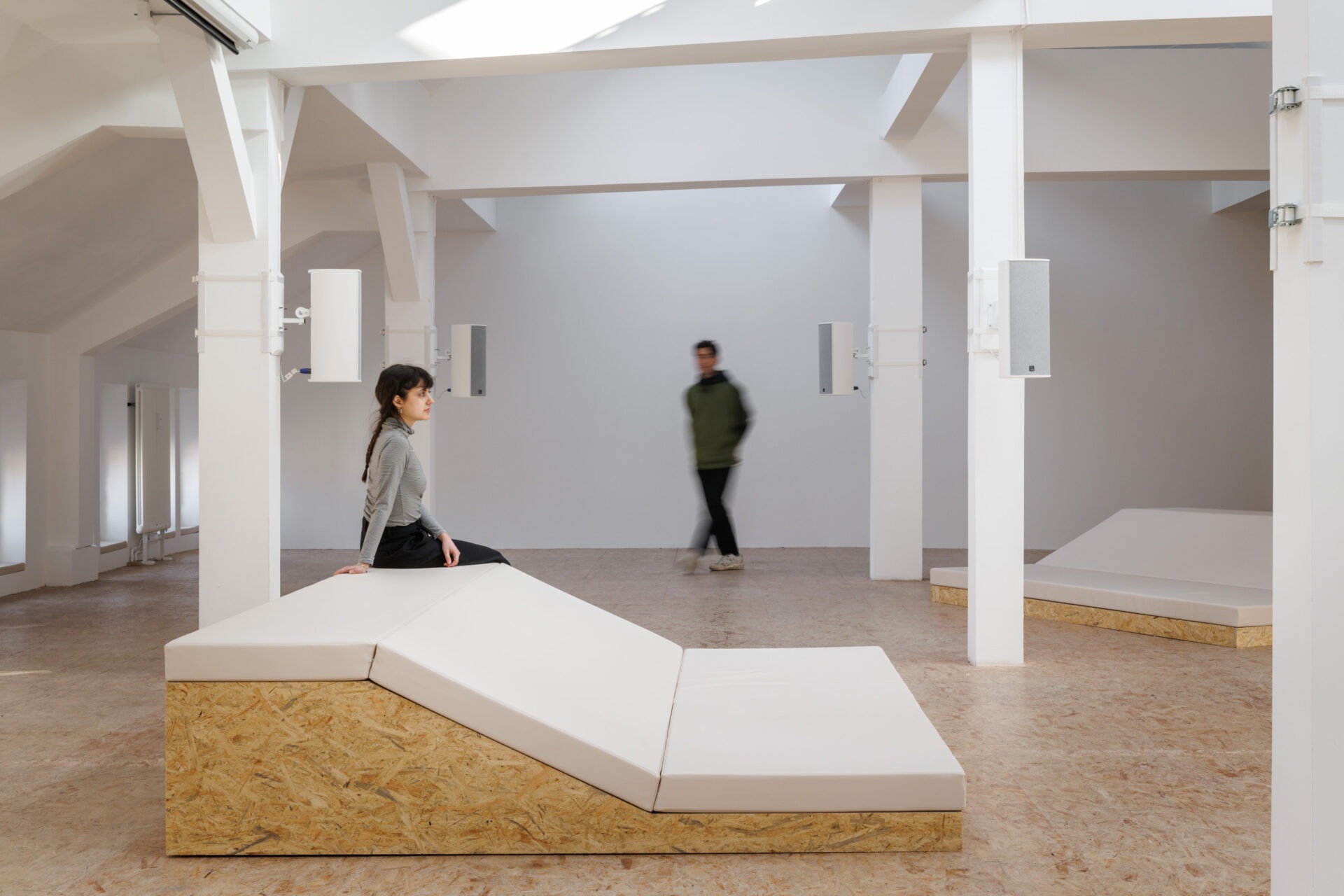
“the intensity of a live concert cannot be exactly captured on a recorded medium”
Time flows so vastly differently live than on a record! How do you address this challenge in your compositions?
I’ve had ongoing trouble reconciling with the fact that the intensity of a live concert cannot be exactly captured on a recorded medium. You cannot capture the tension in the room, the human presence. I’ve also often worked with multichannel formats, which presents an additional challenge.
That is interesting, because while growing up in a more countryside environment, my main relationship to music was through recordings. There were few opportunities for me to attend experimental music concerts there. Actually, I also remember that the first concerts I started to attend were quite disappointing. I had created this imaginary world in my head while getting lost in the recordings, and the actual experience of the concert in real life felt really underwhelming. This all changed after I moved to Berlin. So in a sense, I have been totally flipping that script on its head.
But I feel I’m increasingly interested in coming back to the recorded medium now, and I want to concentrate on it again. So I can’t answer you in a definitive manner, since I haven’t resolved that tension for myself. But I think ideally each medium deserves its own attention.
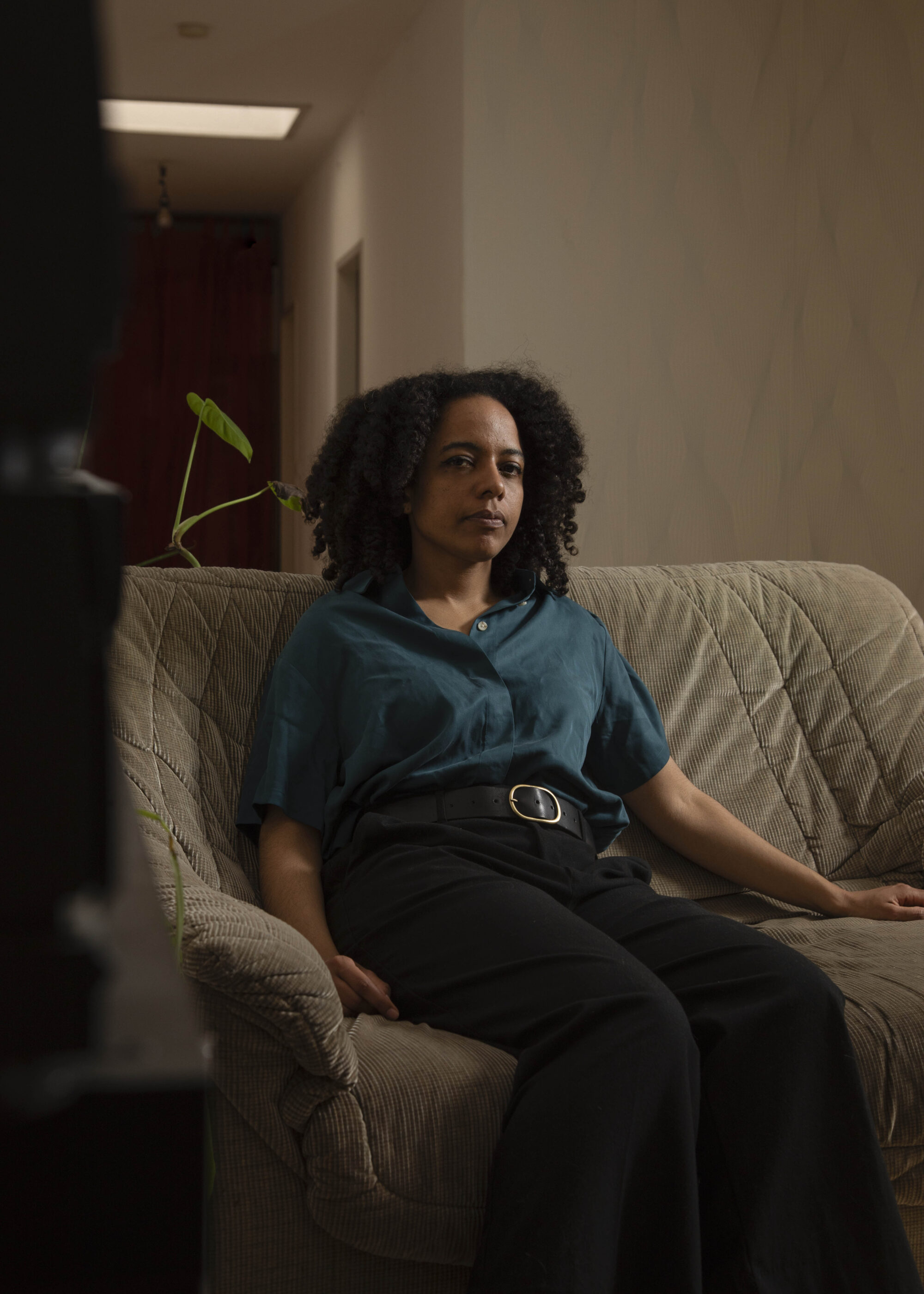
“To think about it through the medium itself”
You have been living in Berlin for a long time now. Although having some obvious upsides, most of the people I know left after a couple of years. Do you see yourself living there in the future?
Well, yes my original plan was literally to die in this city actually, because it felt that there were no other places with so many opportunities and offerings for experimental music. It has been such a magical place full of crazy people with the most original ideas. But things are starting to be tougher for a while, even though it looks like a global trend and not only confined to the city. It is really hard to predict how things will be, and if or how long it’ll be possible to keep going in those conditions.
Compared to other artists, I would consider your record output slow-paced. This is by no means a criticism, quite the contrary. How do you decide what material will be used for a record?
I can be a quite slow-paced person indeed. But I think there are other external factors that led to that. There was COVID and its consequences. It interrupted the vinyl production chain among others. “Manifolds” got delayed for about two years, meanwhile I did a lot of commissioned work which actually felt like a time of intense musical output. Additionally, the mass of music being released every year feels quite overwhelming to me. I don’t have quite the answer yet here either, only to witness that so far the records were released because I’ve been asked to do so. Most of the time they stemmed from a specific project. Currently, I feel like I might want to go about it in a different way. To think about it through the medium itself.
“to have a deeper sense of space”
A lot of musicians that I know discover the possibilities of multichannel later in their career. From what I understand you worked with wave field synthesis right from the get go. Quad seems to be your standard concert setup. When you start to think about a composition, is the spatialisation of sound a primary parameter?
I started to think about the spatial element of sound early, because I came from a sound art environment. After that experience, the best middle ground between a proper multichannel set up and a stereo system seemed to be a quadraphonic arrangement. It is the minimum number of speakers for an audience to have a deeper sense of space, and is also fairly accessible. By accessible, I mean that most music venues I played at were able to set up four speakers. As I sort of mentioned before, I’m in a moment where I am considering new approaches. And I’m considering going back to a stereo set up. Because of my experience with multichannel systems, stereo feels like a sort of multichannel system in itself. A 2.1 system.
And do you translate spatial movements as fixed parameters into a concert? Or do you prefer the “acousmonium-approach” of playing with spatialisation like an instrument?
In general in a concert setting I don’t “move” the sound, unless there would be a specific reason for that. I concentrate on the real-time processing of the sound. The impression of movement is created by the relationship between the different elements and their interaction with the space.
I tried the “acousmonium approach” when I played “Manifolds”. I do a diffusion when presenting it on the GRM system itself. Even though that’s definitely an historical approach, it felt quite refreshing to me since it was different from what I was used to doing. The acousmonium was really thought of as an instrument that you can play and improvise on.
Do you have a fixed multichannel setup at home, respectively, do you listen to multichannel pieces at home? I am asking because for some reason we never developed much of a practice to release music in that form…
I have two additional monitors that I use when I need to compose in multichannel to have an idea of how it actually sounds. But other than that, I do not listen to multichannel pieces at home. I wouldn’t know where to find those kinds of files, even… I suppose we never release music in that format because this is not a consumer standard, and that is thus not easily accessible to the average audience. Personally I’m really interested in the questions of accessibility. But I have the feeling that there are more developments in that area being pushed by the home cinema as well as the tech industries.
Would it be fair to say that playing concerts is the main focus in your practice?
So far it has been like that, although it wasn’t really the result of a conscious decision. But I find myself yearning to record again. I’m curious to go back to exploring this medium.
“I’m creating my own rules with each patch”
Do you enjoy being on the road a lot?
I never did those kinds of big tours, where you drive around for an extensive period of time, changing cities every day. It took me some time to get used to the rhythm of travelling quite intensively as a musician though, but I also really enjoyed the process. It has been a real privilege to be able to see so many places, and discover them through the eyes of promoters and musicians. It changed me and my vision of the world deeply. This lifestyle is definitely intense for the body, I feel like we should talk more often about health among musicians. I’ve learned that I need to pay attention to maintain a balance. So I would answer your question with a yes, even though it is also a challenging lifestyle.
In electronic/computer music we very often are musicians, composers and producers at the same time. Which one of those are the most natural to you? And from that perspective, would you consider Max/Msp your instrument or something else entirely?
The way I presently work was for sure heavily influenced by musical programming, through Max/MSP, even though I’m also open to other ways of doing. Instruments are systems with rules that are pre-conceptualised by their makers. Those rules act as limitations with which the musician is playing, that they learn to master and subvert over time. MaxMSP also has a system in itself but is really open. I’m creating my own rules with each patch. This is how the act of composing takes place. In a sense it feels like creating an instrument every time. I am setting my own limitations, just to try to go over them once they are set.
So I’m in this grey area where I’m all of those roles, and none of them at the same time. Whenever I meet people who are fully one of these, I realize how my approach differs. But I suppose at the end of the day this is what an “electronic musician” is like, so that could perhaps be the closest term to my practice, if we need to define.
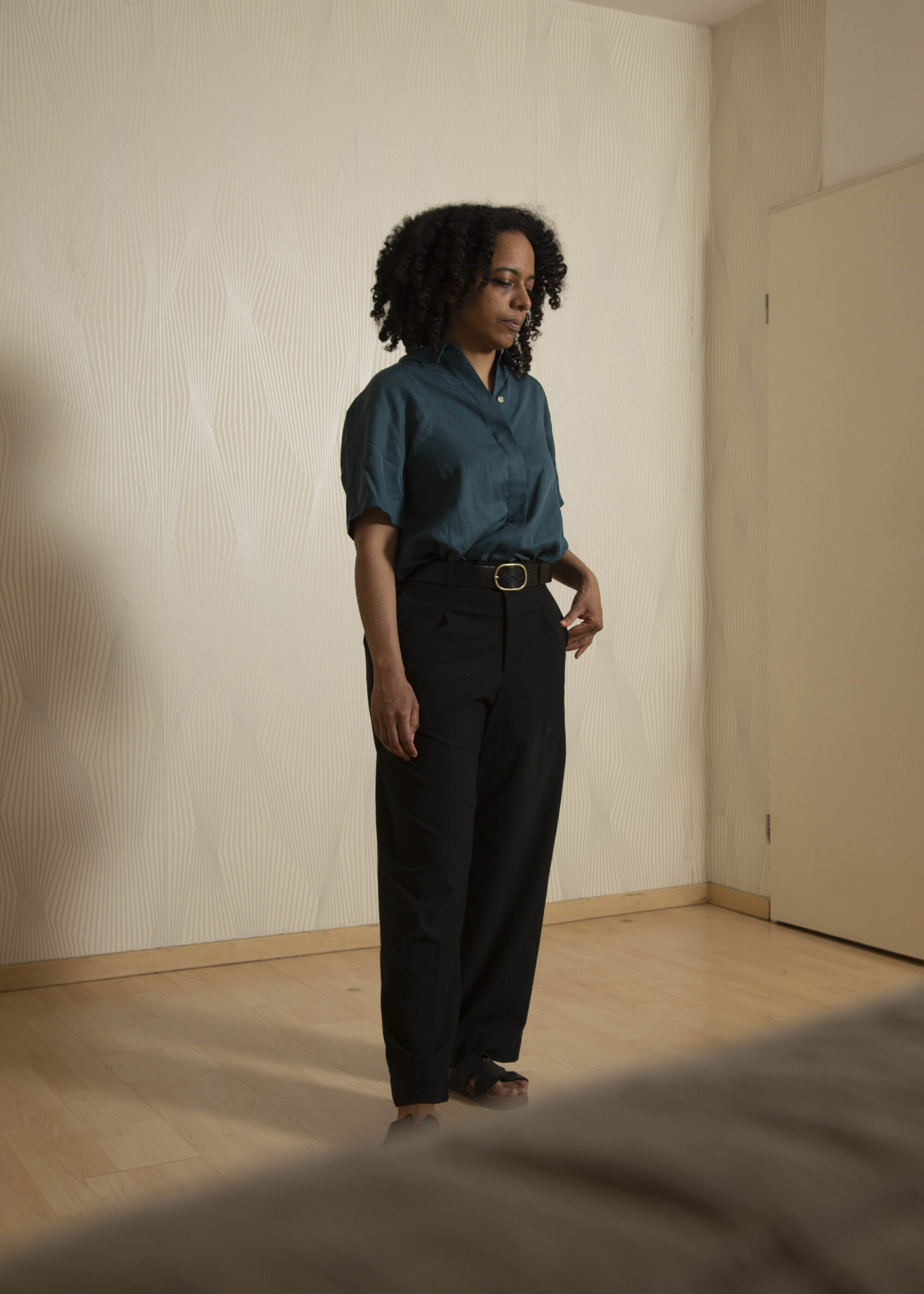
“I’m interested in the question of the plurality of computation”
You work with a computer but a lot of your sounds have an analog quality to them. Do you bother thinking in these categories? I once heard Rashad Becker saying that he has no idea what people mean by a “warm” sound. Would you be able to draw metaphorical lines to sounds that you are attracted to?
I never really used analog gears in my practice, I suppose at first for economical reasons. Especially at the time when I started making my own music, I really had no idea about that topic and about that divide. So I suppose “the warmth” was more the reflection of a taste than anything else, it isn’t that conscious. Nowadays I’m still not especially invested in the topic, but I suppose it is also interesting to me in the sense that it is a way to confuse people, senses and expectations. I feel like these categories are really subjective most of the time. Maybe this sort of divide was also more pronounced some decades ago than it is nowadays. The only way I’ve been interested in this topic so far was at the level of the technical architecture, since I’m interested in the question of the plurality of computation. And in that process I try to understand a little bit better the technical difference between analog and digital computation.
Similarly, there is this divide between academic and underground music. What is your personal experience with these two schools? From my perspective I would place you perfectly in the middle.
I’m not academic at all, but I’ve heard this one or two times so thank you for asking me this question, because I want to take that opportunity to clarify it. I’m not trained in composition at all. I’m not a professor, I don’t have a PhD, I don’t participate in conferences nor do I write papers, etc. Nor do I intend to do that, at least not at the moment. That is what I would call academic. I used to study art history, which gave me an inclination for concepts and history I suppose, and taking this perspective is also a way, at times, to give me guidance in what I do. I think having an idea of history can be really useful, in that it also gives you a deeper perspective than the horizon of short term trends. I did study Sound Studies too, which left its legacy in my interest for process and also for sound in space.
My relationship to academia, I think, has been through the fact that I’ve also been interested in accessing some of the useful knowledge that is trapped sometimes in there. To make it accessible for the people.
I’ve also had a scholarship from the “Berlin artistic research program” in the last 1 1/2 years, but artistic research explicitly positions itself as non-academic research. I started a teaching job during the pandemic but that is fairly average for artists and musicians to have this kind of job too.
So I can’t really talk about academic music since I’m not in this circle and I’m not acquainted with what the people are doing there. I personally situate myself “at the intersection of experimental and electronic music”.
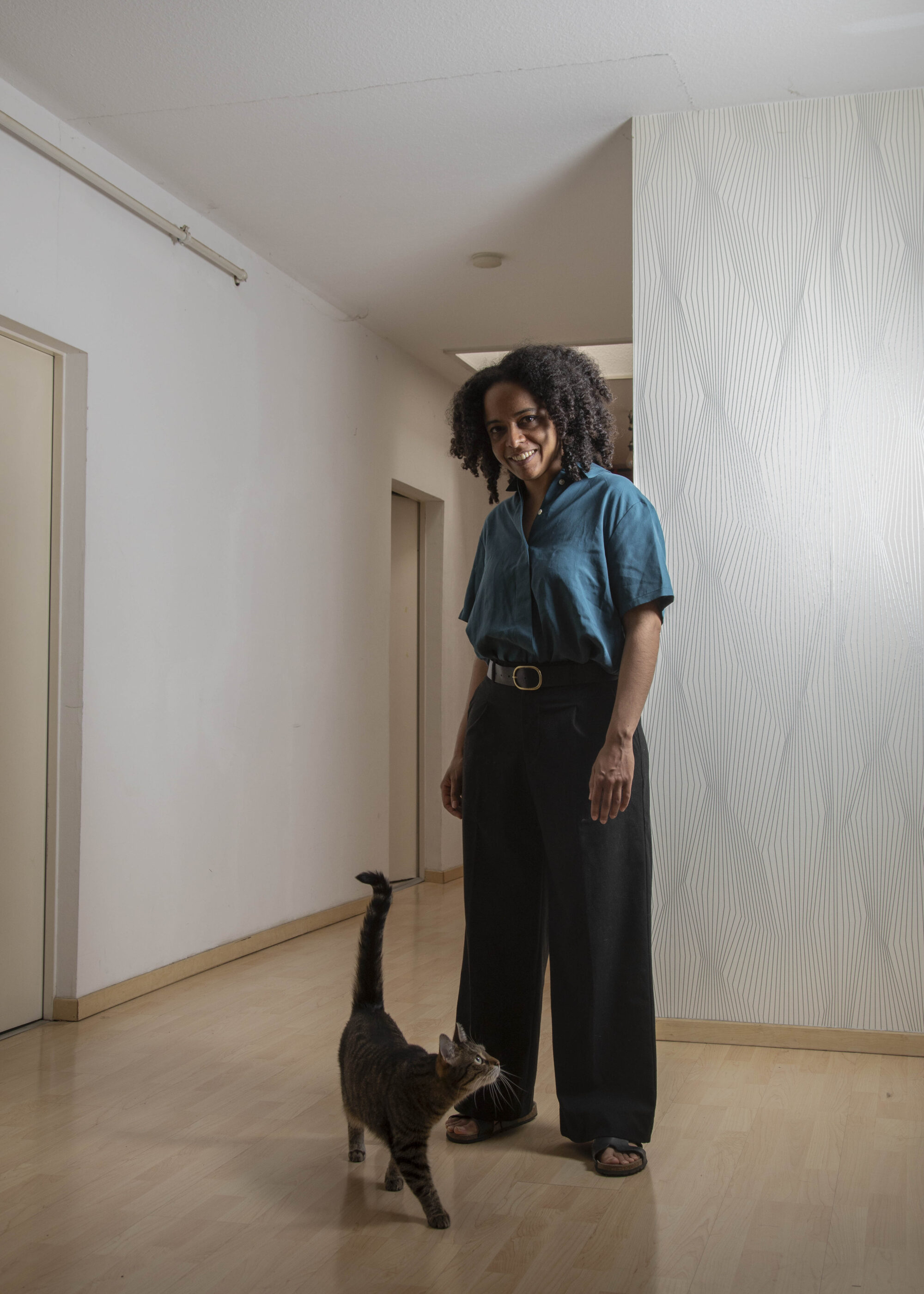
In experimental music, discomfort and pleasure are very close. Specific timbres, composition lengths, loudness, quietness, etc. come to mind. For an untrained ear almost everything we do seems quite off-the-wall. In our scene there is an agreement that a certain level of discomfort is desirable. What would you consider a personal sweetspot, or what would cross the line?
I think the boundaries of “discomfort” are constantly moving… Musically speaking, some things that were really new some decades ago can seem really unremarkable nowadays. Same for our visual culture. You might personally find that you become used to certain things that you might have found more shocking in the past. I love feeling out of my comfort zone, especially when it ends up making me uncover new feelings, ideas, ways of understanding the world and others, or sense where my personal boundaries are. To the latter, it is really important to be able to say ‘no’, and for that you have to learn your boundaries.
I think the only thing I potentially dislike is “shock value” for the sake of it, when it is for example used in an edgelord way, or to prove some kind of alpha maleness. I find it really empty and annoying.
Over the last 20 years the value of music has drastically changed. Availability of records and production tools, obviously AI will dramatically speed this process up. What’s your personal reaction to this trend? Has your relationship to music changed?
I read that, in his time, Max Matthews had to travel to some labs in Manhattan to compute a sound for the whole day. I feel like it’s good to not be anymore in that time. I’m glad to be able to have access to all that wonderful music from all over the world. Simultaneously I find myself to be quite overwhelmed by the mass of music releases these days. I think all that noise has actually perhaps influenced my hesitation to release too often even…
Machine learning can be interesting depending on the application, I’m not opposed to using it where it makes sense. But unfortunately we’re most likely just going to experience a mass production of automatically generated trash content based on stolen training data. Another thing that feels quite scary is the lack of insight we have in the calculations of the technology itself in some areas, and the obsession to give it an agency of its own, which invisibilizes the responsibility of the entities that develop it. What I saw from AI so far wasn’t yet that convincing in the sound territory. Visually speaking there can be some interesting things I guess, even though it’s also clear that it led to some sort of visual homogenisation once it reached mass adoption. And ChatGPT gives wrong answers most of the time. It’s just that if you’re familiar with the processes of algorithmic composition, etc., machine learning feels a little less miraculous.
Thanks!
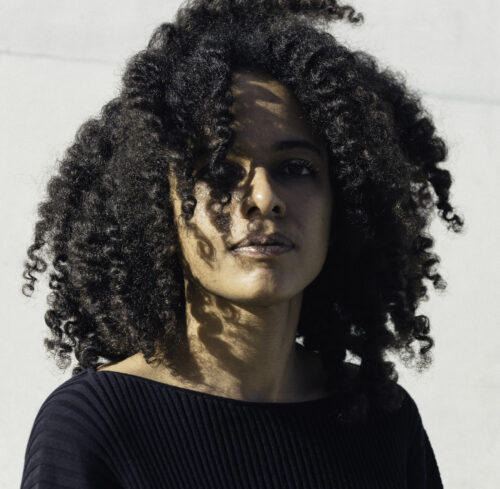
Jessica Ekomane

This article is brought to you by Struma+Iodine as part of the EM GUIDE project – an initiative dedicated to empowering independent music magazines and strengthen the underground music scene in Europe. Read more about the project at emgui.de
Funded by the European Union. Views and opinions expressed are however those of the author(s) only and do not necessarily reflect those of the European Union or the European Education and Culture Executive Agency (EACEA). Neither the European Union nor EACEA can be held responsible for them.